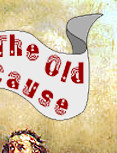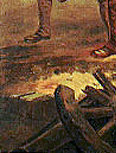|
August
17, 1999
POLITICS AND
THE AMERICAN LANGUAGE
If the truth is the "first casualty
of war," then the honest use of language must be "collateral
damage." George Orwell rather famously dealt with some of the
details in his essay, "Politics and the English Language"
(1945). My topic is different insofar as I deal with the American
language.
That there is an "American language" is subject to argument,
I suppose, but I note that my copy of Larry McMurty's world-famous
Weg in die Wildnis (Lonesome Dove) states that it
is translated "aus dem Amerikanischen" – "from
the American." The incomparable H. L. Mencken certainly thought
there was an American language, or he wouldn't have written The
American Language and its two full-scale supplements.
Another bit of evidence: I was living in West London in the exciting
months when the Soviet bloc's problems with rational economic calculation
and political legitimacy were leading to a spectacular collapse.
(Did anyone wake up Juergen Habermas, the left-liberal authority
on "legitimation crises"?) I kept seeing editorials in
the British press to the effect that we had better get in
there and teach these foreigners decent English before the Americans
show up! Clearly, they thought there was an American language.
Now the American language, such as it is, has taken a few blows
on the road to Empire ("greatness thrust upon" us, as
one flag-waving historian memorably put it). Writing of English-English,
Orwell made up an example of conscious political distortion of meaning.
Thus: "While freely conceding that the Soviet regime exhibits
certain features which the humanitarian may be inclined to deplore,
we must, I think, agree that a certain curtailment of the right
to political opposition is an unavoidable concomitant of transitional
periods, and that the rigors which the Russian people have been
called upon to undergo have been amply justified in the sphere of
concrete achievement." In plain English, Orwell says, this
would read, "I believe in killing off your opponents when you
can get good results by doing so."
This reminds me quite a lot of Mr Jamie O'Shea, the Goebbels or
Vishinsky of the recent NATO "lie-ins" or press briefings
during the non-war/non-peace in or over Yugoslavia. Hearing him
reminded me of the Cockney scholar interviewed in Robert McNeill's
television series, The Story of English. He said that Cockneys
love to use grand-sounding words, as in "'E does all that wif
IMPUNITY." Unfortunately, the ever-alert media informed us
that Mr O'Shea speaks South London English, which ruined that theory;
and just as well, as Americans are rather fond of Cockneys after
all those sentimental movies. ("The miss-aisle rydes foll minely
on Belgryde."1)
Of course Orwell was parodying Stalinist writing, an art form which
doesn't so much die as shift its shape over time, like that foreigner
on Deep Space 9. Its analogues are everywhere. In Memoirs
of a Revolutionist (1958), Dwight MacDonald highlighted the
phenomenon with scary examples from The Nation and
the New Republic (which was born evil and seldom gets above
its raisin'). MacDonald characterized these journals' war-time,
Popular Front, Stalinoid style as "totalitarian liberalism."
A good showpiece is the New Republic editorial (May 7, 1945)
which explained that forced labor imposed, by say, the Soviet state
is not "slavery," since real slavery could only exist
in the wicked private sector.
Conservative historian John Lukacs remarked years ago on the bureaucratization
of American English, which he attributed to Central European influences
and the rise of Pentagonese. (The Capitol Steps' song, "Maxwell's
Silver Grammar," makes the point.) The last two wars for the
American Empire, the Gulf War and the late business over Kosovo
("eight miles high, and when you drop bombs, you'll find that
it's safer than Nam"), have given us all sorts of clever new
expressions. Among these are such gems as "collateral damage,"
"human shields," "humanitarian disaster," "mistakes,"
"willing executioners,"and "sanctions." This
kind of "discourse" (as the trendies like to say) leans
on passive and impersonal constructions in which things "are
done," – but apparently not by actual human beings who
might bear responsibility. Things just kinda "happen"
to people at the hands of somebody-or-other.
I suggest saving the time of the general public, parliaments, trade
unions, special interests, oppressed minorities, and world-saving
bomber pilots by means of an American Imperial/NATO Cliche and Rationale
Maker (it slices, it dices, it never tells the truth). In its simplest
form the CRM consists of three columns. The first consists of noun
phrases like "Secretary Albright and Sandy Berger," "Starkravian
Freedom Fighters," "Free world leaders," "Neo-fascist
particularists," "UNSCUM," and so forth. The second
column contains limp verbs – impersonal and passive: "were
launched," "were encountered," "was said by,"
"were made," "was learned today," etc. The third
column has all the direct objects, passive subjects (so to speak),
dodgy and dishonest modifiers, and the rest.
One has to be very careful in building such a program. Trial-runs
of one program produced unfortunate sentences like "Secretary
Albright and Sandy Berger/ were precipitated/ into the hands of
the KLA" and headlines such as "NATO peace-keepers fail
to exdigitate while Kosovo burns." Well, all I can say is that
mistakes "were made" – "by parties unknown."
I hope those working on the CRM get it together before we suffer
the indignity of seeing headlines such as "Kosovo Quagmire
Deepens, Clinton Says 'What Me Worry?'"
But, hey! – the point is saving time, our time, but most importantly
the precious time of our thrice-blessed New Class managers. I mean,
there are So Many Interventions and So Little Time. If our Kindly
Shepherds can get the word out in little fragments that convey a
mood but never come up to the level of an idea, wouldn't that be
good? Then we could go about our business, subject only to detailed
and constant oversight by legions of Bolshevized lawyers and bureaucrats,
and leave unpleasant topics like foreign policy and killing-large-numbers-of-foreigners-more-or-less-all-the-God-damned-time
to the experts and those who really love that kind of "work,"
that is to say, our own Auswaertiges Amt, KGB clones, Colonial Office,
JFK Counter-Insurgency Legions, Schutz-Staffel G. H. W. Busch, or – to put it to the tune of "The Green Berets": "Fighting
preppies from the East, come to tame the savage beast, we'll tell
them to get in the groove, or we'll bomb whatever moves." (And
lest I slight the humanitarian side of the imperialists' burden,
why not "Help, Rwanda, Help, Help, Rwanda" to the old
Beach Boys tune?) We can safely leave it all to those who "Don't
Stop Thinking About Tomorrow" – and by God they don't, though
unlike the British imperialists ours can barely think about next
Tuesday, much less the long run. One example: the same people who
think "we," that is, the US elite, can bomb everyone who
does wrong until they do right, often believe that we can, with
no inconvenience, invite these same people to live among us as newly
minted motor-voters and "citizens" – in their zillions – and, then, these same people, whose relatives the US has bombed,
will settle into peaceful, productive habits and make our part of
the Global Economy go. This seems problematic, but I suppose it
could all work out....
This brings me to another pet project of mine, the New World Order
Building Code. It defies logic and reason that one does not exist,
when the benefits are so overwhelmingly clear. It is obvious to
me that for the greater convenience of US/NATO, every building (hereinafter
defined as "structures" larger than 6 cubic feet – sorry,
that should have been metric) in any country likely to become the
subject of US/NATO attentions should be required to have a sending
device which makes targeting automatic. I don't know, frankly, whose
buildings would be covered by this innovation in international "law,"
but I guess that if you took a map of the world and colored all
the targets red, the red area would be very large. In fact, the
non-target areas would only take in Euro-Lackeys, the US, and possibly
all those wombats down there who let us listen to everything from
Alice Springs. New Zealand is a bit iffy, because they get so irritable
about our nukes parking in their waters – do they think they are
a sovereign nation, for God's sake? – but they may just get on the
short list. Then again, they may be in need of a coup. Oh, yes,
the New, happy, and prosperous South Africa may make the short list.
We may need a special clause for Chinese embassies, or more map
seminars.
Which brings me back to George Orwell. After serving on the side
of the Left in the Spanish Civil War he wrote Homage
to Catalonia to express his shock at how the Stalinists
had cared as much about killing off their "fellow" leftists
– Trotskyites, anarchists, and republicans – as they did
about defeating the reactionaries and fascists. (I make that distinction
because Franco was a Catholic reactionary and never an ideological
fascist: my contribution to Accuracy in Media.) During the recent
bout of "rockets' red glare" and "bombs bursting
in air" – as well as on top of civilians in Serbia and
Kosovo (simultaneously destroyed and saved), a number of militarist
left-wing intellectuals – the Frogs in particular – allowed
that the exercise was "their" Spanish Civil War. Quite
right, old Frogs, it is indeed your Spanish Civil War and you, poor
Froggies, are the Stalinist fellow-travelers of the piece. You've
sent us your Levi-Strauss (who wasn't much of a tailor), your incomprehensible
Derrida, and your Louie Half-Hussar, and we've earned the right
to tell you to shut up. ("We," the actually existing American
people, not the American state.)
I don't know what my very distant collateral relation, Francis Scott
Key, would think about all this. Certainly, the bombs and rockets
in that unsingable song of his were weapons of rather wimpy destruction
and, for once, someone was throwing them around besides the Americans,
and, worse luck, at the Americans. The bomb-throwers of 1812-14
were the footmen and lackeys (Cockneys again?) of our mentors and
teachers in the arts of Empire, the Anglo-Norman elite – in
business since about 1171, when Strongbow invented the Irish Problem
– and whose advisory role Mr. Tony Blair is even now reinventing.
(And isn't it interesting how the Brits could run the world without
ever dealing with those issues just next door? Sound familiar?)
If things don't get better soon, I aim to find the words to "Anacreon
in Heaven," from which cousin Scott Key, innumerable times
removed, took his melody. Under present circumstances, they're bound
to be more palatable than his and might well serve well enough at
patriotic occasions. Just avoid that high note, unless you've had
voice lessons with Slim Whitman. Even lefty Woody Guthrie's "This
Land Is Your Land" isn't all bad, especially in bluegrass arrangement,
and Jefferson Airplane's "Volunteers of America" has its
moments, but would need a little ideological reworking. There is
also some promising material in the works of Hank Williams, Jr.,
but the most obvious alternative national anthem is still "America
the Beautiful." Who the Hell ever suffered "collateral
damage" or even a flesh wound from an amber wave of grain or
purple mountains' majesty?
We are rapidly reaching the point where we need a reason to even
like this country. I suggest geography – spacious skies and
fruited plains – even if that is reportedly the least studied
subject in our so-called schools, ignorance of which affects even
those who run the place. The rulers can learn, however. In 1945,
they didn't know where Korea was, but soon managed to get us into
a war there. Any day now, they'll work out that there is a significant
difference between Switzerland and Sweden aside from the last several
consonants. I'm not sure how remedial geography lessons for the
overlords will affect the "rules of engagement" and cruise
miss-aisle schedule, since, as persons with no sense of place, the
overlords slide easily from the notion of "place" to that
of "target."
To be honest, I was partly kidding just now. There are a great many
reasons to like and even love this country. It's just that almost
none of them are in the reclaimed bit of swampland which Virginia
and Maryland foolishly ceded some two hundred years ago. In that
cession, "mistakes" – for once – actually "were made."
As for Mr. O'Shea, one can only hope that 'e runs into quoite a
bit of rine on his next trip to Spine. 'Oo knows, 'e moight 'ave
to give up loying for a few dyes, and that would be a real chynge.
[1] This – and other songs cited in this
essay – are available in The Kosovo Occupation Song Book
and Ammo Box, vol. I (1999).
Joseph
R. Stromberg has been writing for libertarian publications since
1973, including The Individualist, Reason,
the Journal
of Libertarian Studies, Libertarian Review, and the
Agorist Quarterly,
and is completing a set of essays on America's wars. He is a part-time
lecturer in History at the college level. You can read his recent
essay, "The
Cold War," on the Ludwig
von Mises Institute Website. His column, "The Old Cause,"
appears each Tuesday on Antiwar.com.
Please
Support Antiwar.com
A
contribution of $20 or more gets you a copy of Justin Raimondo's
Into the Bosnian Quagmire: The Case Against US Intervention in
the Balkans, a 60-page booklet packed with the kind of intellectual
ammunition you need to fight the lies being put out by this administration
and its allies in Congress. Send contributions to
Antiwar.com
520 S. Murphy Avenue, #202
Sunnyvale, CA 94086
or
Contribute Via our Secure Server
Credit Card Donation Form

|









